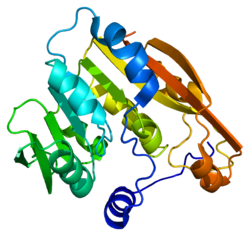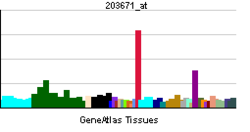硫嘌呤甲基轉移酶
硫嘌呤甲基轉移酶(英語:Thiopurine methyltransferase或Thiopurine S-methyltransferase,EC 2.1.1.67),又稱巰基嘌呤甲基轉移酶或巰嘌呤甲基轉移酶,簡稱TPMT,是一種催化硫嘌呤類化合物甲基化的酶。硫嘌呤類藥物常用於癌症化學療法及免疫抑制療法,因而TPMT的活性會影響使用這類藥物時不同患者對藥物的敏感性和毒性反應。[1][2]
| 硫嘌呤甲基轉移酶 | |||||||||||||
|---|---|---|---|---|---|---|---|---|---|---|---|---|---|
 蛋白質資料庫渲染的2bzg結構 | |||||||||||||
| |||||||||||||
| 標識 | |||||||||||||
| 代號 | TPMT; [] | ||||||||||||
| 擴展標識 | 遺傳學:187680 鼠基因:98812 同源基因:313 ChEMBL: 2500 GeneCards: TPMT Gene | ||||||||||||
| EC編號 | 2.1.1.67 | ||||||||||||
| RNA表達模式 | |||||||||||||
 | |||||||||||||
 | |||||||||||||
| 更多表達數據 | |||||||||||||
| 直系同源體 | |||||||||||||
| 物種 | 人類 | 小鼠 | |||||||||||
| Entrez | 7172 | 22017 | |||||||||||
| Ensembl | ENSG00000137364 | ENSMUSG00000021376 | |||||||||||
| UniProt | P51580 | O55060 | |||||||||||
| mRNA序列 | NM_000367.2 | NM_016785.2 | |||||||||||
| 蛋白序列 | NP_000358.1 | NP_058065.2 | |||||||||||
| 基因位置 |
Chr 6: 18.13 – 18.16 Mb |
Chr 13: 47.12 – 47.14 Mb | |||||||||||
| PubMed查詢 | [1] | [2] | |||||||||||
藥理學 編輯
TPMT是硫嘌呤類藥物(如硫唑嘌呤、巰嘌呤和硫鳥嘌呤)的代謝中最主要的酶之一,起到的作用是在這類化合物的硫原子上增加一個甲基;這個過程中提供甲基的是S-腺苷甲硫氨酸,後者同時被轉化成S-腺苷-L-高半胱氨酸。[4] TPMT基因的缺陷會讓人體無法將這類藥物滅活,未代謝的藥物因此在體內大量累積,從而引起嚴重甚至致命的骨髓抑制,表現為貧血、血小板減少症(導致出血)和白細胞減少症(導致感染)等。[2][5]
臨床意義 編輯
研究顯示,臨床上大約5%的硫嘌呤類藥物療法由於毒性原因而終止。[6] 一般來說,在使用硫嘌呤類藥物前及治療過程中會多次測量病人的TPMT酶活性,以防止TPMT不活躍者(佔總人口約10%)及TPMT無活性者(佔總人口約0.3%)在使用這類藥物後產生的嚴重骨髓毒性。[4] 近年來也開始採用基因測試,相對於前者優點在於測試不需要反覆進行。[7]
參考資料 編輯
- ^ 1.0 1.1 Entrez Gene: TPMT thiopurine S-methyltransferase. 美國國家生物技術信息中心. [2012-07-02]. (原始內容存檔於2010-03-08).
- ^ 2.0 2.1 Yates, C. R.; Krynetski, E. Y.; Loennechen, T.; Fessing, M. Y.; Tai, H. L.; Pui, C. H.; Relling, M. V.; Evans, W. E. Molecular diagnosis of thiopurine S-methyltransferase deficiency: Genetic basis for azathioprine and mercaptopurine intolerance. Annals of internal medicine. 1997, 126 (8): 608–614. PMID 9103127.
- ^ Lee, D.; Szumlanski, C.; Houtman, J.; Honchel, R.; Rojas, K.; Overhauser, J.; Wieben, E. D.; Weinshilboum, R. M. Thiopurine methyltransferase pharmacogenetics. Cloning of human liver cDNA and a processed pseudogene on human chromosome 18q21.1. Drug metabolism and disposition: the biological fate of chemicals. 1995, 23 (3): 398–405. PMID 7628307.
- ^ 4.0 4.1 Weinshilboum, R. M.; Sladek, S. L. Mercaptopurine pharmacogenetics: Monogenic inheritance of erythrocyte thiopurine methyltransferase activity. American journal of human genetics. 1980, 32 (5): 651–662. PMC 1686086 . PMID 7191632.
- ^ Fujita K, Sasaki Y. Pharmacogenomics in drug-metabolizing enzymes catalyzing anticancer drugs for personalized cancer chemotherapy. Curr. Drug Metab. August 2007, 8 (6): 554–62. PMID 17691917. doi:10.2174/138920007781368890. (原始內容存檔於2013-01-12).
- ^ Reuther LO, Vainer B, Sonne J, Larsen NE. Thiopurine methyltransferase (TPMT) genotype distribution in azathioprine-tolerant and -intolerant patients with various disorders. The impact of TPMT genotyping in predicting toxicity. Eur. J. Clin. Pharmacol. January 2004, 59 (11): 797–801. PMID 14634700. doi:10.1007/s00228-003-0698-8.
- ^ Payne, K.; Newman, W.; Fargher, E.; Tricker, K.; Bruce, I. N.; Ollier, W. E. R. TPMT testing in rheumatology: Any better than routine monitoring?. Rheumatology. 2007, 46 (5): 727–729. PMID 17255139. doi:10.1093/rheumatology/kel427.
- ^ Genome Bioinformatics Group, Center for Biomolecular Science and Engineering. Human Gene TPMT (uc003ncm.1). UCSC Genome Browser. University of California Santa Cruz. [2008-07-25]. (原始內容存檔於2021-04-14).